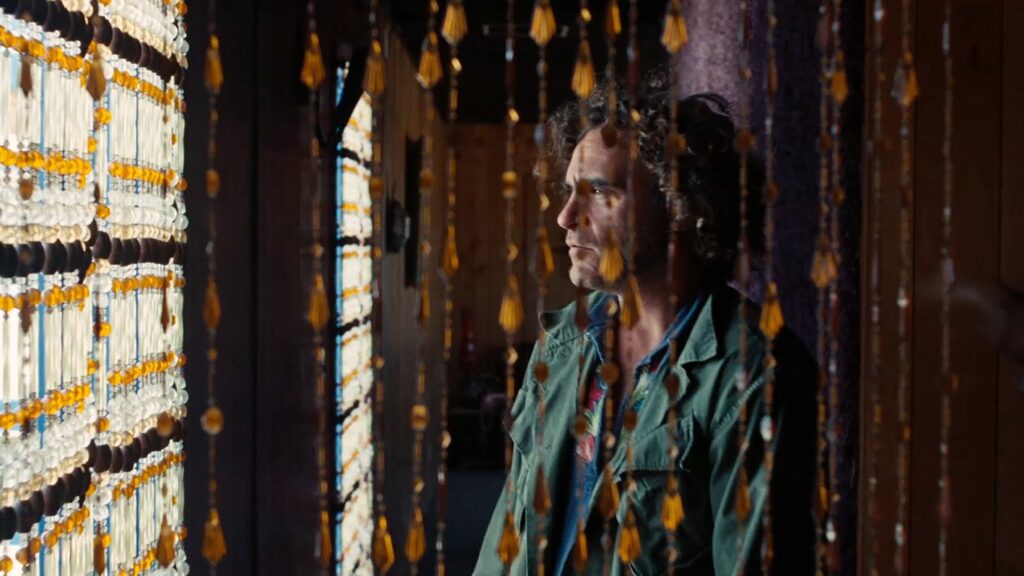Many consider Thomas Pynchon’s 2009 novel Inherent Vice to be a minor work; the New York Times’ review dubbed it “Pynchon Lite.” Choosing a seriocomic yarn about a perpetually weed-affected private dick as the source material for his seventh feature might have seemed like similarly trivial territory for Paul Thomas Anderson after There Will Be Blood and The Master, two grim films about corrupt, powerful men. But “minor” ultimately means little with these artistic giants in their respective fields. Inherent Vice seems like breezy, insignificant fare on the surface, but the film’s red-eyed ramble achieves the same thematic ends as his more carefully structured dramas. This time, however, Anderson’s ruined subject isn’t simply a man, but a crumbling generational utopia. The hazy intrigue begins when an old flame, Shasta Fey Hepworth (Katherine Waterston), suddenly shows up in Larry “Doc” Sportello’s (Joaquin Phoenix) home, asking for help. She’s caught up in something involving a Jewish real-estate developer, his wife, her lover and a whole bunch of neo-Nazis — friends of the family. Said developer, Mickey Wolfmann (Eric Roberts), then disappears, and Shasta — who had been carrying on an affair with him when she met up with Doc —disappears along with him. So Doc’s on the case, stumbling in his own pot-induced stupor onto new leads at every turn. Naturally, it turns out that the case is bigger than it at first seems, and that everything is connected…maybe. Among other things Doc discovers there’s a whole lot of Chinese heroin involved and a cult of dentists linked to that. It’s a lot to take in, but in the end the plot details matter less than the underlying social vision it outlines. It’s the end of the tumultuous 1960s — 1970 Los Angeles, to be exact — and by now, the hippie movement has been co-opted by industry, and all the supposed subversion behind their calls for peace and love was merely a hiding ground for more violent, hateful types. Like an early client of Doc’s, Tariq Khalil (Michael K. Williams), tellingly notes, Tariq’s black-power prison group and the Aryan Nation essentially share similar views on the U.S. government. And speaking of the feds, they’ve infiltrated all the movements, feeding off the crashed and hopeless dopers in order to turn them into special agents. The government, the hippies, the Nazis, the doctors, the rehab clinics: everything’s a cult.
this film’s red-eyed ramble achieves the same thematic ends as Paul Thomas Anderson’s more carefully structured dramas
If this film is a high, then its a paranoid one. We even see Doc standing in front of a white board drawing lines from one case to the next, out of his mind connecting the disparate dots. That image represents the experience of watching Inherent Vice in miniature: the disorienting experience of trying to piece together information you can hardly grasp before Doc, and by extension Anderson himself, moves on to the next major revelation, the next comic set-piece. The most obvious point of comparison in Anderson’s filmography, then, is Boogie Nights, with its shift from the high-rolling porn industry ’70s to the crash of the ’80s. In Inherent Vice, though, Anderson skips over the good times entirely, going straight for the comedy of despair, suggesting that the ’70s were themselves a bad hangover from the free-love ’60s. Anderson technically hasn’t tackled the ’60s, but his last two features explored other periods of American history that engendered feelings of disillusionment. Doc could be seen as an extension of The Master’s Freddie Quell: a lost figure searching for an ideology. Instead of grasping onto the mumbo-jumbo offered by a Lancaster Dodd father-figure type, however, Doc tries to find his own way, not so much looking for the answers to life’s big questions as simply trying to figure out what the hell is going on around him. If anything, Anderson’s Los Angeles is full of Dodd-like figures, forming a wall of ideological power. Our hero is too stoned to be susceptible to their wiles, but his meddling presence is as accusatory of corrupted power as the downfall of Daniel Plainview in There Will Be Blood and perhaps even more direct in its constant interrogation. Above all else, though, Inherent Vice is simply a blast to watch, with a great supporting cast (especially Josh Brolin as Bigfoot Bjornsen, the hippie-hating detective, and Joanna Newsom as Sortilege, Doc’s friend, sometime hallucination and narrating conscience) wandering in and out of the picture and Anderson always ready to pull out of mostly sustained mediums and close shots for a punch line in a long shot. And then there’s Joaquin Phoenix at the center of this stoned screwball maelstrom, giving us a rare look at his comedic chops, his timing always perfectly too slow (most memorably when he takes two seconds to look at a picture of a heroin-ruined child before screaming in terror). Inherent Vice is an almost structureless film with near perfectly constructed comedy hiding a darker, deeper underbelly the way the L.A. sun and pot smoke filling the frame obscure the dreaded come-down that’s happening all around.

